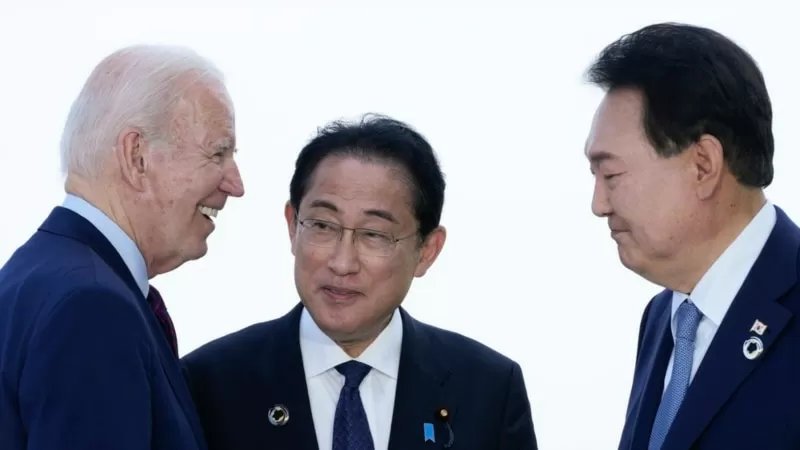Washington – The recent signing of a memorandum of cooperation on the Trilateral Security Cooperation Framework (TSCF) between the United States, South Korea, and Japan has sparked a debate among experts in Washington about the durability of this partnership in the event of a second term for former President Donald Trump.
The memorandum, while not legally binding, aims to institutionalize the security partnership between the three nations against threats from China and North Korea. It calls for regular high-level talks, joint exercises, and other exchanges to strengthen trilateral cooperation.
However, some experts are concerned about the future of this partnership if Trump were to be reelected. Bruce Klingner, senior research fellow for Northeast Asia at the Heritage Foundation, expressed his concern, stating that the progress made in recent years could potentially be undone by a second Trump presidency.
The Biden administration, on the other hand, has been vocal about the importance of trilateral cooperation in their Indo-Pacific strategy. They have also highlighted the historic Camp David summit in August 2023, where the three leaders “inaugurated a new era of trilateral partnership.”
In a recent opinion piece published in The Washington Post, Secretary of State Antony Blinken, Defense Secretary Lloyd Austin, and White House national security adviser Jake Sullivan emphasized the effectiveness of the U.S. security partnership in the Indo-Pacific region, citing the cooperation among the United States, South Korea, and Japan as a prime example.
However, the uncertainty of how a second Trump presidency would affect this partnership looms. Trump has previously emphasized the need for U.S. allies to pay their “fair share” of defense costs and has demanded that South Korea and Japan pay more for the cost of the U.S. military presence in their countries. This has raised concerns about the future of the TSCF under a Trump administration.
Michael O’Hanlon, director of foreign policy research at the Brookings Institution, stated that it is difficult to predict whether the TSCF would survive a second Trump term, as most things are personalized with him. He added that Trump’s previous business dealings may influence his decisions regarding the partnership.
However, some experts believe that the TSCF would continue under a second Trump administration. Richard Armitage, who served as deputy secretary of state during the George W. Bush administration, stated that Trump would likely allow the institutionalization of the TSCF, considering the strong support from both sides of the aisle.
Frederick Fleitz, who served as chief of staff of the National Security Council in the Trump White House, also expressed his belief that the partnership would continue, as Trump is a strong supporter of alliances, particularly in the Asian Pacific region.
Meanwhile, China’s rise as the greatest threat in the Indo-Pacific theater is a fact that cannot be ignored by any of the three countries. Evans Revere, former acting assistant secretary of state for East Asia and Pacific affairs, stated that there is a growing perception among the three countries of the common threats and challenges they face from China’s attempts at political, military, and economic intimidation.
Revere also believes that the three countries can effectively institutionalize trilateral security cooperation, even if there is a change of administration in one or more of the three capitals.
As the U.S. gears up for the 2024 presidential election, Vice President Kamala Harris, who is widely predicted to continue on the path set by President Biden, is expected to maintain the policies of the current administration. Gary Samore, former White House coordinator for arms control and weapons of mass destruction during the Obama administration, stated that Harris does not have a clearly established record on U.S.-South Korea-Japan security cooperation, but he expects her to follow the policies of the Biden administration on this issue.
Blinken, Austin, and Sullivan highlighted in their opinion piece that the transformed approach towards the Indo-Pacific region is “one of the most important and least-told stories of the foreign policy strategy advanced by President Biden and Vice President Harris.”
In conclusion, while there may be some uncertainty about the future of the U.S.-South Korea-Japan security cooperation in the event of a second Trump presidency, experts believe that the partnership will continue to strengthen and institutionalize, given the common threats and challenges faced by the three nations. The Biden administration’s commitment to trilateral cooperation and the support from both sides of the aisle in the U.S. Congress also provide a strong foundation for the durability of this partnership. As the U.S.

